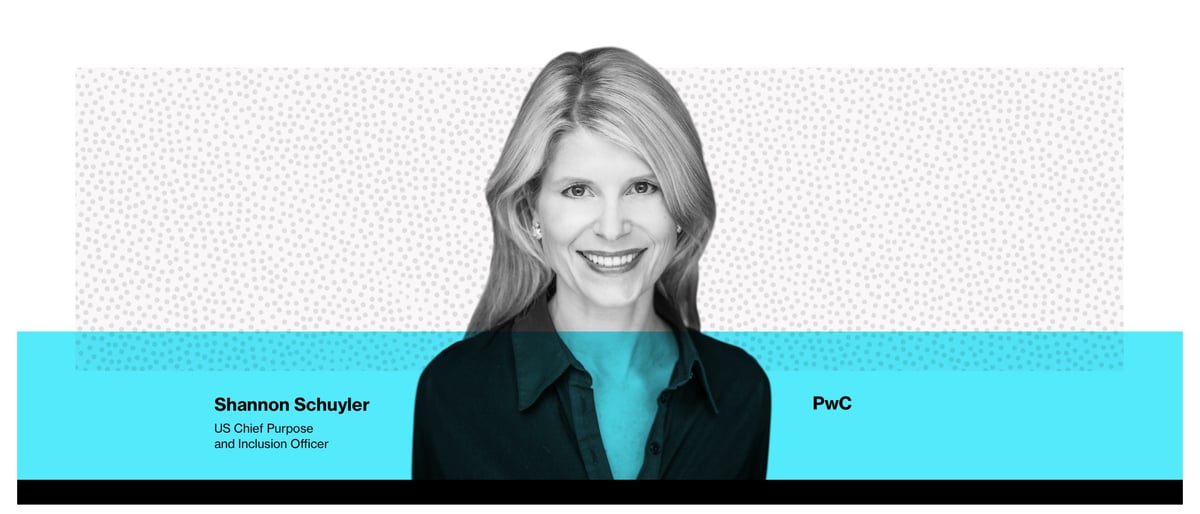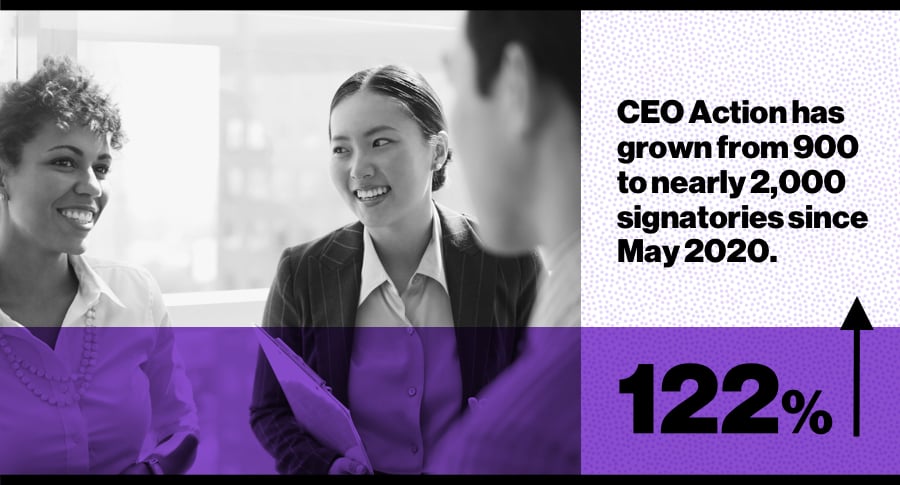
Candid Conversations About Race Can Help Businesses Drive Allyship
In May 2020, PwC’s US Chief Purpose and Inclusion Officer Shannon Schuyler and her family watched the video of a White police officer pressing his knee against the neck of George Floyd, a Black man, for eight minutes and 46 seconds, which led to his death on a Minneapolis street.
It was a moment of reckoning across America, sparking protests and triggering renewed commitments across the business community to address systemic societal racism. Thousands of business leaders turned to CEO Action for Diversity & Inclusion (CEO Action) to address one of the most critical issues facing our nation.
In 2017, PwC’s U.S. Chair and Senior Partner Tim Ryan co-founded CEO Action alongside 150 other CEOs in a collective effort that recognized diversity, equity and inclusion opportunities are societal, not competitive. CEOs who become signatories pledge to uphold four commitments: share best and unsuccessful practices, implement unconscious bias training, create and share a diversity and inclusion strategy with their board, and host complex, sometimes difficult conversations about diversity and inclusion.
Today, CEO Action is powered by nearly 2,000 CEOs and their CHROs and CDOs, making it the largest CEO-driven business initiative to advance diversity and inclusion in the workplace. As the pandemic, civil unrest, a presidential election and economic upheaval made many people feel more divided than ever, having conversations that cultivate understanding became increasingly critical, and common. But for progress to be made, Schuyler emphasizes that it’s essential that these conversations inform the actions that leaders take.
“You cannot understand the experiences that marginalized communities have faced until you ask individuals about their personal stories,” says Schuyler, who co-leads CEO Action in addition to her role at PwC. “Once you hear them you cannot just say, ‘That’s really unfortunate,’ and move on. You have to hear that story and use it to inform the actions you take to create change for that person.”
On April 1, CEO Action reinforced the importance of these conversations through its third annual Day of Understanding. Nearly 400 organizations took part and leaned on one another to create opportunities for collaboration, providing tips for leading practices and helping to turn conversation learnings into bold actions.
“You can’t have a conversation with an employee or group of employees once and feel like you are good for the year,” says Schuyler. To create meaningful change, leaders need to have conversations with their people about what they’re experiencing every single day. “Whenever I think I’m self-aware, I have a conversation that makes me realize just how much I don’t know,” she says.
Schuyler continues to lead and scale these conversations within PwC and advises hundreds of other leaders on how to hold conversations designed to derive insights that help drive action. Here are a few pieces of her advice:
Engage the White majority and help them get uncomfortable
Listening to personal stories from people who have experienced racism and have been held back is hard—it’s emotional and heavy. In the past year alone, business leaders have hosted conversations about the killing of Black Americans, the pandemic’s impact on marginalized communities, political divisiveness, violence against Asian Americans, the insurrection at the Capitol and much more.
None of these topics are easy to hear about and discuss, and the issues raised are challenging to solve, so Schuyler says leaders should start with a willingness to hear feedback and stories that are often difficult to confront. White leaders should also be willing to look in the mirror and consider whether they could have done more.
“White individuals can no longer claim that they don’t know about the blatant inequities in this country,” says Schuyler. “They have to acknowledge that they were born with an inherent privilege. And they have to be willing to face uncomfortable truths every day to begin to help make things right.”
To equip individuals to host these conversations, CEO Action provides an array of resources and shared learning opportunities. A curated library of signatory-sourced materials includes videos, interactive experiences and conversation guides for in-person and virtual workshops, and signatory-led community groups, webcasts and convenings to help businesses lean on one another and benefit from shared learning.

Have candid conversations constantly
Schuyler, who has worked at PwC for over 26 years, says she is still learning about the experiences of the firm’s people. This past month, she helped lead a conversation with PwC’s diversity staff council and was floored when she heard the stories of individuals recounting the experiences they had as children, which have tremendously impacted how they think and act at work.
As she continues the work of being an inclusive leader, Schuyler is helping to guide others on how to do the same. This year, the firm will roll out a global diversity and inclusion digital badge to help reinforce that being an inclusive leader is a learned skill that takes attention and practice. At the end of the day, she notes, these conversations are much more than just talk.
“Inclusive leadership requires an ongoing commitment to candid conversations, but also to truly listening,” she says. “Giving others a forum to voice and share their personal experiences and opinions requires courage and humility, but truly understanding our peoples’ perspectives can result in valuable insights—ones that can lead to behavior shifts and initiatives designed to dismantle barriers. When we approach our people with a sense of openness and allyship and allow their perspectives to inform how we do our work, that’s when true, actionable progress is made.”
Take action as allies
According to Schuyler, in order for change to happen, action should be taken immediately after hearing of an inequity. The fundamental principle of an ally is to use one’s position of power to create meaningful change for someone who does not have that power. So, for candid conversations to be impactful, action should follow.
Schuyler recounts a 2016 employee forum on race in which a Black male employee shared that he’d been stopped several times by police when driving to a client site in a predominantly White neighborhood. Until that moment, his co-workers thought he had a time-management problem. Once they learned about the real problem, firm leaders spoke to the employee’s managers and to the client.
“This story changed the way I saw my own privilege,” says Schuyler. “I realized, I will never have an experience like that. No one is going to pull me over for being too White. I couldn’t just hear that story and move on. We had to change the situation for our colleague, and for others.”
Across PwC, leaders continue to host regular conversations and take action to address current challenges. While the firm had been preparing to release data, events of last May accelerated the release of its first Diversity and Inclusion Transparency report in August.
Employees expect that PwC will drive large scale societal impact, helping break down the barriers that create inequality in our society. To support an equal path to career and economic advancement for Black and Latinx students, Schuyler recently led the launch of the refreshed Access Your Potential, a $125M commitment to support 25,000 Black and Latinx college students to prepare for and begin in-demand careers.
“Simply, every conversation needs to lead to an action, whether big or small,” says Schuyler.
